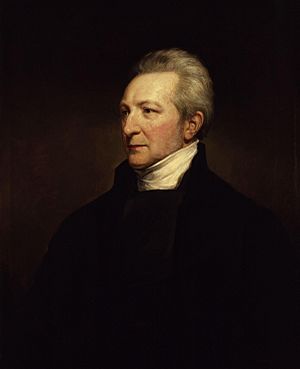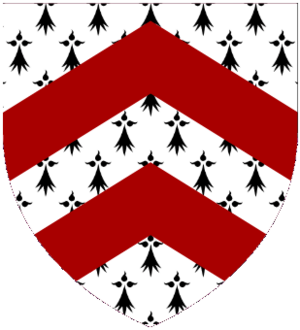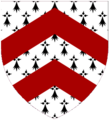John Bird Sumner facts for kids
Quick facts for kids The Most Reverend and Right Honourable John Bird Sumner |
|
|---|---|
| Archbishop of Canterbury | |

Portrait by Margaret Sarah Carpenter
|
|
| Church | Church of England |
| Diocese | Canterbury |
| In Office | 1848–1862 |
| Predecessor | William Howley |
| Successor | Charles Longley |
| Other posts | Bishop of Chester (1828–1848) |
| Orders | |
| Ordination | 1803 |
| Consecration | 1828 |
| Personal details | |
| Born | 25 February 1780 Kenilworth, Warwickshire, England |
| Died | 6 September 1862 (aged 82) Addington, Surrey, England |
| Buried | St Mary's Church, Addington |
| Education | Eton College |
| Alma mater | King's College, Cambridge |
John Bird Sumner (born February 25, 1780 – died September 6, 1862) was an important leader in the Church of England. He served as a bishop and later became the Archbishop of Canterbury. This was the highest position in the Church of England.
Contents
Early Life and Education
John Bird Sumner was born in Kenilworth, Warwickshire, England. His father, Robert Sumner, was a vicar, which is a type of priest. His mother, Hannah Bird, was related to William Wilberforce, a famous person who worked to end slavery. John also had a brother, Charles Richard Sumner, who also became a bishop.
John Bird Sumner went to two well-known schools. He studied at Eton College and then at King's College, Cambridge University.
His Career in the Church
After finishing his studies, John Bird Sumner started his career.
Teacher and Priest
In 1802, Sumner became a teacher at Eton College, where he had once been a student. The students there gave him the nickname "Crumpety Sumner." In 1803, he became a priest.
Later, in 1817, he became a Fellow of Eton. This meant he was a senior member of the college. The school also gave him a church position in Mapledurham, Oxfordshire.
Becoming a Bishop
From 1819 to 1828, Sumner worked as a special priest in the Durham area. In 1828, he became the Bishop of Chester. A bishop is a senior leader in the church who oversees many churches in a certain area. During his time as Bishop of Chester, many new churches and schools were built.
Archbishop of Canterbury
In 1848, John Bird Sumner was chosen to be the Archbishop of Canterbury. This was a very important role. As Archbishop, he earned a large income.
He also became a member of the House of Lords, which is part of the British Parliament. He supported Catholic emancipation, which meant giving more rights to Catholics. This decision caused some disagreement with other church leaders.
In 1851, Sumner led the church service for the grand opening of the Great Exhibition. This was a huge event held in "The Crystal Palace" in London.
Sumner wrote many books and articles. His writings were very popular, especially among people who followed the evangelical way of thinking in the church. Two of his most famous books were about creation and the Christian faith.
He was also involved in some important debates. For example, he disagreed with another bishop, Henry Phillpotts, in a case about church beliefs. He also supported a law that allowed divorce but opposed other laws, like one that would have allowed people to marry their deceased wife's sister. He was also against allowing Jewish people to become members of Parliament.
Sumner was the president of the Canterbury Association. This group helped to found the city of Christchurch in New Zealand. In 1848, he was also made a Fellow of the Royal Society, which is a group for important scientists.
Family Life
In 1803, John Bird Sumner married Marianne Robertson. They had several children together. Marianne passed away in 1829.
John Bird Sumner died on September 6, 1862, when he was 82 years old. He was buried at St Mary's Church, Addington.
His Legacy
John Bird Sumner is remembered in several ways.
- There are portraits of him in different places, including University College, Durham and Lambeth Palace.
- A statue of him can be found in Canterbury Cathedral.
- A school in London, Archbishop Sumner Church of England Primary School, is named after him.
Images for kids



